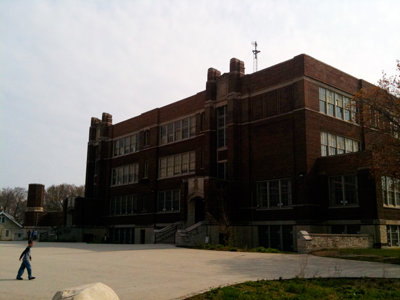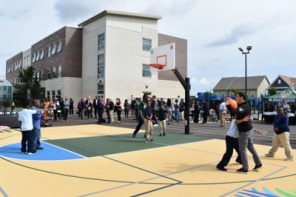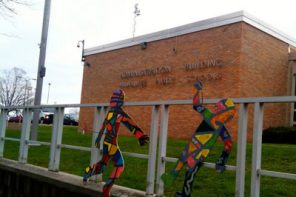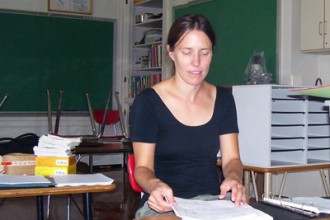If you read my blog posts, you know I support public education. You may have also gleaned that I believe in the public Montessoris in Milwaukee.
Not only is Milwaukee’s group of public Montessoris a one of a kind in the U.S. – I believe no other public district has as many of them – but they work.
When the WKCE scores came out a few months ago the public Montessori community rejoiced. The numbers offered concrete proof that the public Montessoris are on the right track, outpacing not only all MPS schools, but, in most cases, state scores, too.
We’ve noticed that administration has noticed, too. While some sensed that superintendent Dr. Gregory Thornton didn’t quite buy in to the Montessoris yet when he arrived a year ago, we’ve seen changes.
For example, the Montessoris are waived from participating in the district-wide reading curriculum. Also, at a recent teacher training day, the Montessori teachers were, for the first time under this administration, allowed, to attend their own Montessori-focused training.
It’s not a mystery. Dr. Thornton has said many times that he wants to encourage and expand on what’s working in MPS. And over the past few months he’s often pointed to the Montessoris as examples of success in the district.
If we needed more proof that public Montessori is ripe for encouragement and expansion in MPS, check out “Milwaukee Today: An Occasional Report of the NAACP,” prepared by UWM’s R.L. McNeely, David Pate and Lisa Ann Johnson.
The report, issued last month, focuses on education, employment, income and other topics in Milwaukee’s African-American community.
The report, estimating that 40% of African Americans in MPS will ever earn a degree, says, “Despite the efforts of very dedicated public school teachers, many African Americans enrolled in Milwaukee Public Schools appear to be on a fast track for unemployment and incarceration.”
That’s 27th in the nation in terms of black male graduation rates, according to the report.
But, it notes that MPS outperforms voucher schools in both reading and math and then adds:
“Prospects for educational achievement are brightest for Milwaukee Public School students who are enrolled in Montessori schools.”
Using 2009-10 numbers, the report notes that while one in two African Americans in MPS is proficient in reading (57.6 percent in Wisconsin overall), 69 percent of African Americans in the MPS Montessori schools are proficient. Among Latinos, those numbers are 60 percent in MPS and 81.3 percent in the Montessoris.
In math, 39.4 percent of African Americans in MPS are proficient vs. 60.2 percent in the MPS Montessori schools. In language arts the numbers are 34.3 percent in the district, 59.3 percent in the Montessoris.
But check out these numbers.
While 32.4 percent of African American MPS students are proficient in science, more than double that number – 66.1 percent – of African American students in the Montessoris are proficient.
In social studies, 47.3 percent of African American kids are proficient in the subject in MPS in general, but 82.2 percent are proficient in the subject in the Montessori schools.
The scores are based on WKCE tests at Craig (on the Northwest Side), Fernwood (in Bay View), MacDowell (on the near West Side) and Maryland Avenue Montessori (on the East Side) schools. The Montessori program is still being phased in at Lloyd Barbee (in the old Garden Homes Elementary School). Another MPS charter school, Kosciuszko, has a Montessori program, too.
There is also a Montessori International Baccalaureate High School housed in the former Juneau High School building. That has struggled. However, the issue is being discussed right now on Vliet Street and in the public Montessori community in Milwaukee.
In September, Wauwatosa Public Schools opens the door on its first public Montessori program, too. As is the case at most MPS Montessoris, the new Tosa program already has a waiting list.
While those in the Montessori schools caution against making the existing programs too big to remain successful, it is clearly time for MPS to consider creating capacity by opening more Montessoris.
There is an Association Montessori Internationale (AMI) training center in Milwaukee, The Montessori Institute of Milwaukee, that helps provide teachers, and the waiting lists show that demand already exceeds supply for Montessori in the district.
Add in that Garden Homes Montessori, which was an MPS contract school, is gone and many of the families there are looking for new public Montessori homes for their kids.
As the WKCE results and, now, this NAACP report suggest, if you build it, they will come. And if they come, they will be successful.


 i evaluate to yes even if there's no image
i evaluate to yes even if there's no image  i evaluate to yes even if there's no image
i evaluate to yes even if there's no image  i evaluate to yes even if there's no image
i evaluate to yes even if there's no image  i evaluate to yes even if there's no image
i evaluate to yes even if there's no image  i evaluate to yes even if there's no image
i evaluate to yes even if there's no image  i evaluate to yes even if there's no image
i evaluate to yes even if there's no image 